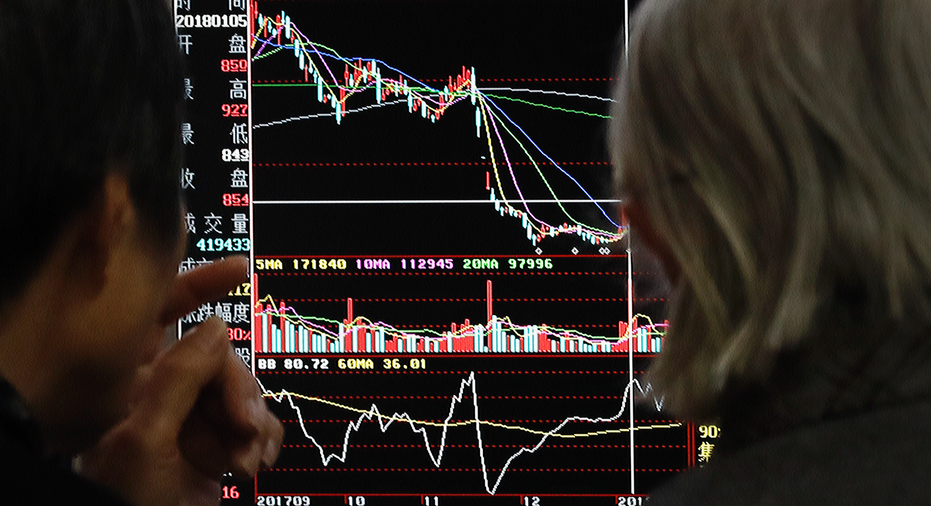Broad global economic growth powers international fund flows

As the U.S. stock market climbs further into record territory, investors are increasingly putting money on a relatively less expensive alternative: funds that own international equities.
Inflows to long-term mutual funds and exchange-traded funds, or ETFs, focused on international stocks have been increasing this year and also outpacing flows into funds invested in U.S. stocks, according to data from the Investment Company Institute.
The trend reflects optimism on the part of investors that a broad global economic resurgence that began last year will continue in 2018. And that sets the stage for international stocks to deliver stronger earnings and potentially see their share prices move higher. International stocks haven't had as big a run-up as U.S. equities in recent years, which makes the non-U.S. stocks a relatively cheaper buy for investors.
"Non-U.S. investing is a great way right now to play the strong synchronized growth theme," said Jon Eggins, senior portfolio manager at Russell Investments. "We see stronger likely economic growth and earnings growth outside of the U.S. versus in the U.S., even with the recent tax reform."
As recently as 2016, the global economy was still stuck in a slump in the aftermath of the Great Recession of 2007-2009 and a debt crisis in Europe. China's economy was slowing steadily, raising fears of economic fallout in the developing countries that supply raw materials to the world's second biggest economy.
That changed last year, as the global economy picked up, with Europe, Japan, China and many developing nations growing in tandem for the first time in a decade.
All told, 120 countries, representing three-quarters of world economic output, enjoyed economic growth in 2017, creating the broadest global expansion in seven years, according to the International Monetary Fund.
So what's the outlook for 2018? The international lending agency recently forecast global growth of 3.9 percent for this year and next year, up from an estimated 3.7 percent gain in 2017. In its outlook, the IMF noted surprisingly strong growth in Europe and Asia.
While stronger economies overseas have helped boost profits at U.S. multinational corporations, one of the reasons the Standard & Poor's 500 stock index delivered strong gains in 2017, international stocks haven't experienced as big a run-up as U.S. equities.
That's why many investors betting on the thesis of continued global growth continue to shift money into funds that focus on overseas companies.
"The U.S. is at absolute, high-market valuations, and these other markets are also, they're just significantly cheaper than the U.S," said Eggins.
He noted that much of the U.S. stock market's 2017 gain relative to global markets was due to rising valuations as investors increasingly became more willing to pay more for stocks.
For those considering beefing up their portfolio with holdings in international companies, there are no shortage of options.
Eggins manages the Russell Tax-Managed International Equity Fund (RTNSX), which invests in companies in Europe, Japan, Australia and Canada, as well as those in developing markets.
The fund, which launched just under three years ago, finished 1 percent higher than its benchmark, iShares' MSCI All Country World ex-U.S. Index.
Another approach involves investing in funds that target stocks in emerging markets, essentially companies in developing nations like China and India.
That's the aim of the Neuberger Berman Emerging Markets Fund (NEMIX). Its holdings include companies in China, Taiwan, India and South Korea. The fund is up about 41 percent over the past year, while its benchmark, the MSCI Emerging Markets Index, rose about 37 percent in the same period.
Economies in emerging markets have been growing. A weaker dollar, now at three-year lows, has helped, said Conrad Saldanha, portfolio manager of the Neuberger Berman Emerging Markets Fund.
"That growth you're seeing plays out from an emerging markets context in the more global growth oriented markets," he said. "Those that are linked to global growth, such as China, are performing strongly this year."
Saldanha noted that energy and financials are among the best performing sectors in emerging markets.
"The other area is exposure to the global consumer," Saldanha said. "Today in emerging markets global consumer spending is higher than in developed markets."
Long-term, Saldanha is betting emerging markets stocks will continue to rise, driven by revenue and earnings growth.
"We've already seen a nice upshot this year in emerging markets," he said.



















